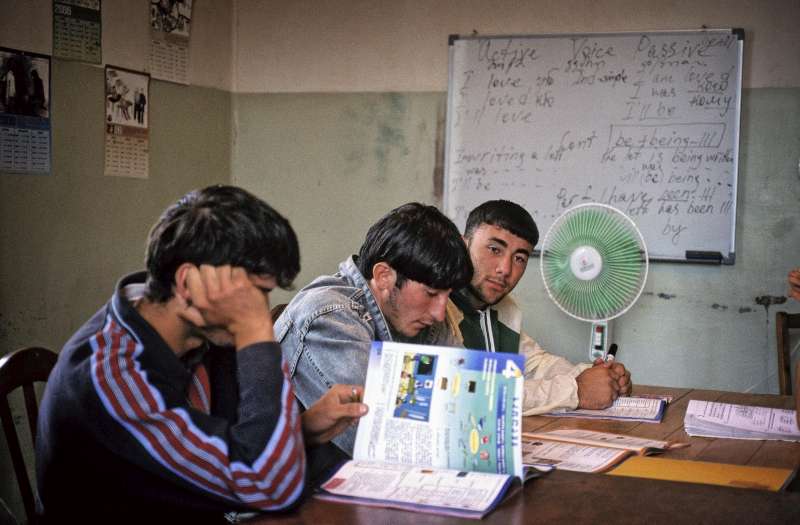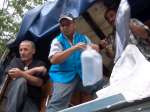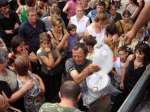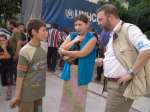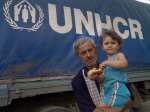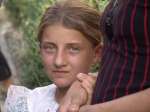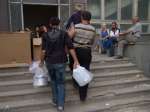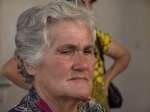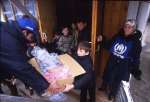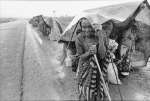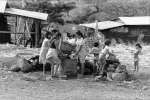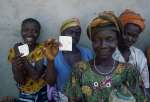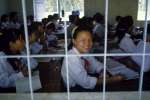- Text size
 |
|  |
|  |
| 
- Français
Georgia project leads the way for socio-economic integration of refugees
News Stories, 20 December 2010
TBILISI, Georgia, December 20 (UNHCR) – The UN refugee agency has joined forces with the UN Development Programme (UNDP) to launch a project that should ease the socio-economic integration of Chechen refugees in a poverty-stricken corner of Georgia as well as benefit their host communities. The project, in the Pankisi Gorge region, could become a model for other operations.
UNHCR has been helping Chechen refugees in the Pankisi since 1999, when about 8,000 fled to the valley region from neighbouring Chechnya in the Russian Federation. Most have either returned to Chechnya or moved to Western Europe, but about 800 remain in the area, where they live alongside Georgian Kists.
"It is now time to start responding to the needs of everyone who lives in this picturesque but impoverished valley in north-east Georgia, and not just the refugees," said Peter Nicolaus, who has just completed his tour of duty as UNHCR representative in Georgia. "This is where the expertise of our sister agency, UNDP, can help."
Under a memorandum of understanding signed by the two organizations earlier this month, UNHCR will phase out individual assistance and UNDP will make it easier for locals and refugees in the Pankisi to attend schools where they can receive structured training and develop professional skills. UNDP support will focus on local development and on boosting employment prospects.
Areas that look particularly promising include carpentry, sewing and bee-keeping. "There is a market out there, beyond our valley, we just need help to capitalize on it," said Ramzan, who wants to set up an association with other bee-keepers to sell their quality product.
Zurab, who hires six people in his carpentry workshop, also has ambitious plans. "We would like to expand and we are ready to provide on-the-job training," he said.
UNHCR has helped people like Ramzan and Zurab get started, but UNDP is now prepared to help them take the next step and expand their business and, in the process, contribute to the development of the Pankisi region.
Farming is also important, especially the raising of cattle and sheep. UNDP's training centres will teach refugees and locals about keeping a healthy herd of dairy cows as well as training people to become vets. Farmers will learn new agriculture technologies and more effective ways of farming while agricultural value chains and infrastructure will be established.
"Our work in Pankisi is an example of how United Nations agencies complement each other for the benefit of the people," said Jamie McGoldrick, the UN resident coordinator in Georgia. "UNHCR kick-started the economic development of the valley with its assistance to refugees. UNDP is now stepping in to expand those activities to a larger-scale economic and social development programme."
UNDP's expertise can develop and strengthen strategies for promoting sustainable economic growth, especially focusing on building partnerships with the private sector and encouraging new ways of involving business in national development.
The development organization will also carry out disaster risk reduction initiatives to help manage environmental threats, such as flash floods, in the region. Earlier this year, when floodwaters threatened 200 households in the valley, UNDP helped the local authorities to clean the Alazani River channels in order to protect people's homes and farms.
This so-called transitional solutions initiative could become a model for UNHCR and UNDP to apply in other countries where integration is seen as the best solution for refugees and other displaced people. Next year, UNHCR and UNDP hope to expand the programme to help internally displaced people living in other parts of Georgia.
By Suzanne Murray-Jones in Tbilisi, Georgia
